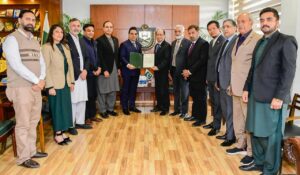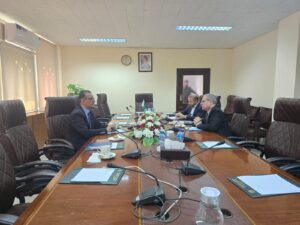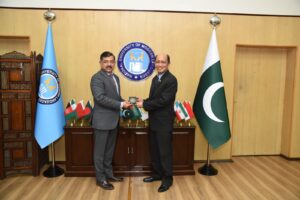The Spirit of Teamwork: How Pakistan Regained Its Global Respect

I still remember the 1982 Hockey World Cup with a sense of pride and nostalgia. At that time, Pakistan’s hockey team stood as an embodiment of excellence, discipline and teamwork. The field was graced by legends such as Manzoor-ul-Hassan Senior, Qazi Muhib-ur-Rehman, Rasheed-ul-Hassan, Abdul Rasheed Junior, Hassan Sardar, Kaleem Ullah Khan, Muhammad Hanif Khan, Salim Ullah Khan, Samiullah Khan and Shahid Ali Khan. These names were not merely players; they were the architects of Pakistan’s sporting glory. Against them, even the strongest opponents seemed powerless. Their unity, precise passing, and relentless coordination created a rhythm that overwhelmed rivals and brought victory after victory. Success appeared destined to follow wherever their sticks touched the turf.
Today, I see the same spirit of teamwork revived—not on the hockey field, but in the leadership of Pakistan. Under the combined wisdom and cooperation of President Asif Ali Zardari, Prime Minister Muhammad Shahbaz Sharif, Speaker National Assembly Sardar Ayaz Sadiq, Chairman Senate Syed Yousaf Raza Gillani, Field Marshal Syed Asim Munir, and other government and parliamentary figures, Pakistan seems to be rediscovering its lost momentum. Each of them is playing their role with responsibility and harmony, guiding the nation towards progress and stability, much like the synchronized play of our hockey legends four decades ago.
There was a time when Pakistan stood isolated on the international stage. Foreign leaders and delegations hesitated to visit Islamabad. Our diplomacy seemed subdued, often defensive, and the world viewed Pakistan through a lens of uncertainty. The tragic attack on the Sri Lankan cricket team in Lahore had further darkened our image, sealing our sports fields and silencing the cheers of millions of cricket lovers. The sense of exclusion was painful and prolonged.
However, the tide began to turn with courage and unity. On May 8 and 9, 2025, the leadership of Pakistan demonstrated unprecedented resolve and composure in response to India’s provocative actions. The manner in which Pakistan acted surprised both friends and foes. It was not aggression, but confidence—born out of national solidarity and institutional harmony. This display of resolve became a turning point. Pakistan’s pride was restored, and the world acknowledged the country’s maturity, unity, and strength. Nations that once looked upon us with suspicion began to recognize our courage and independence. From that moment, Islamabad started to regain its rightful place as a hub of global engagement.
The months that followed became a testament to this transformation. Parliamentary diplomacy took a leading role in rebuilding Pakistan’s international image. Speaker Sardar Ayaz Sadiq hosted a series of high-level parliamentary delegations in Islamabad, including the Trilateral Speakers’ Meeting in early October 2025, aimed at deepening institutional cooperation between Pakistan, Türkiye, and Azerbaijan. Likewise, under the able guidance of Chairman Senate Syed Yousaf Raza Gillani, Pakistan hosted the Conference of Speakers of the Inter-Parliamentary Union, where Islamabad emerged as a vibrant centre of multilateral dialogue and democratic exchange. The event symbolized Pakistan’s re-entry into the global parliamentary family as a confident, respected, and forward-looking democracy.
On the diplomatic front, Pakistan’s foreign engagements in 2025 were remarkable in scope and substance. In February 2025, President Asif Ali Zardari welcomed Sheikh Khaled bin Mohamed bin Zayed, the Crown Prince of Abu Dhabi, at Aiwan-e-Sadr. The two leaders reaffirmed the enduring Pakistan-UAE partnership and pledged to expand cooperation in trade, infrastructure, and technology.
In September 2025, Pakistan and Saudi Arabia signed a landmark Strategic Mutual Defence Agreement, pledging that any act of aggression against one would be considered aggression against both—an event that marked the dawn of a new era in defence and security cooperation. Later, in October 2025, Prime Minister Shahbaz Sharif met Crown Prince Mohammed bin Salman in Riyadh during the 9th Future Investment Initiative Conference (FII9). The meeting centred on deepening economic, energy, and defence partnerships, and the Saudi leadership lauded Pakistan’s new direction under stable and united governance.
In September 2025, Prime Minister Shahbaz Sharif’s visit to the United States reinforced bilateral relations. His meeting with President Donald Trump and senior U.S. officials focused on trade, investment, and regional stability. The Prime Minister invited American companies to invest in Pakistan’s energy and technology sectors, underscoring Pakistan’s openness and readiness to facilitate mutually beneficial economic ventures.
At the center of Pakistan’s dignified and determined response stood General Asim Munir, whose leadership defined the nation’s composure during the one-day war of May 2025. His calm yet decisive command reflected strategic brilliance, discipline, and deep patriotism. In those critical hours, he combined restraint with resolve, ensuring that Pakistan defended its sovereignty with dignity while averting a wider regional escalation. His foresight and quiet strength inspired confidence within the armed forces and across the nation.
In the aftermath of the conflict, Pakistan’s diplomacy entered a new era of confidence and respect. Backed by stable leadership and renewed trust in its institutions, the country witnessed a surge in international engagement. The United States, Turkey, Saudi Arabia, the United Arab Emirates, and other allies extended gestures of solidarity and partnership, commending Pakistan’s resilience and maturity. This wave of goodwill strengthened Pakistan’s global standing and opened new opportunities for cooperation in trade, defense, and energy—signaling the beginning of a new chapter characterized by stability, dignity, and forward-looking progress under General Asim Munir’s stewardship.
The change in global perception is palpable. Nations that once hesitated to engage with Pakistan now extend invitations and warm welcomes to its leaders. Pakistani delegations are received with respect abroad, and Islamabad has become a frequent host of international visitors. The once-deserted cricket stadiums of Pakistan are now vibrant again, hosting international tournaments with teams from across the globe—except one. The sound of applause once more echoes across Lahore, Karachi, Faisalabad, and Rawalpindi, symbolizing a nation that has reclaimed its confidence and respect.
Pakistan’s journey from isolation to recognition has been neither short nor simple. It has been achieved through collective wisdom, courage, and the seamless teamwork of its civil, military, and parliamentary leadership. The same harmony that once made our hockey team world champions now defines our governance and diplomacy. As our leaders act with unity and vision, Pakistan’s flag rises higher on the world stage. The nation, strengthened by teamwork and guided by purpose, is destined to shine brighter with every passing day.


